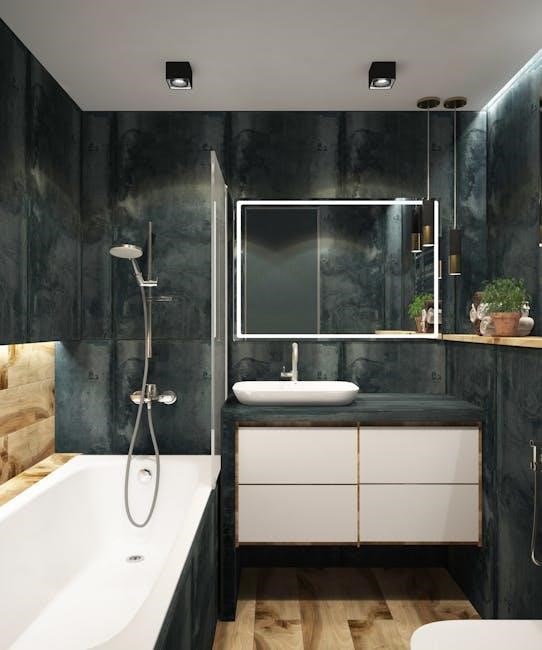the clean house sarah ruhl pdf

Sarah Ruhl’s The Clean House is a captivating blend of magical realism and romantic comedy, exploring themes of love, grief, and identity through its unique storytelling and vivid characters․
Overview of the Play
The Clean House by Sarah Ruhl is a romantic comedy infused with magical realism, set in the home of Dr․ Lane and her sister Virginia․ The story revolves around Matilde, a Brazilian housekeeper who struggles with her duty to clean, as it fills her with sorrow․ Instead, she aspires to become a comedian․ When Lane’s husband, Charles, falls in love with Ana, a cancer patient with a remarkable ability to make people laugh, the dynamics of the household are disrupted․ The play explores themes of love, loss, and healing, blending tragedy with humor through its fluid mix of realistic and surreal elements․ Its unique tone and structure make it a compelling exploration of human emotions and relationships․
Historical and Cultural Context
The Clean House by Sarah Ruhl premiered in 2004 at Yale Repertory Theatre, blending contemporary American themes with elements of Latin American magical realism․ The play reflects Ruhl’s fascination with how cultural identities intersect, particularly through Matilde, a Brazilian housekeeper whose backstory adds a cross-cultural dimension․ Set against the backdrop of modern American life, the play explores universal themes of love, grief, and identity while maintaining a humorous and surreal tone․ Its production coincided with a growing interest in magical realism in American theatre, making it a significant work in the early 2000s․ The play’s success, including its Susan Smith Blackburn Prize, highlights its cultural relevance and artistic innovation․

About the Playwright: Sarah Ruhl
Sarah Ruhl is a celebrated American playwright known for her unique, poetic style and exploration of human emotions․ Her works, including The Clean House, Eurydice, and In the Next Room, have earned critical acclaim and numerous awards, solidifying her place in contemporary theatre․
Background and Other Works
Sarah Ruhl is a prominent American playwright born in 1974, known for her lyrical and imaginative storytelling․ She earned a BA from Brown University and an MFA from Yale University․ Ruhl’s plays often explore themes of love, family, and the supernatural, blending realism with poetic language․ Her notable works include Eurydice, a reimagining of the Orpheus myth, and In the Next Room (or The Vibrator Play), which explores intimacy and innovation in the 19th century․ Ruhl has received numerous accolades, including the Susan Smith Blackburn Prize for The Clean House and a Pulitzer Prize finalist nod for the same play․ Her writing continues to captivate audiences with its emotional depth and unique perspective․
Style and Themes in Her Writing
Sarah Ruhl’s writing is characterized by its poetic lyricism, blending magical realism with emotional depth․ Her plays often explore themes of love, family, and identity, with a focus on the interconnectedness of life and death; Ruhl’s use of language is both evocative and subtle, allowing characters to express complex emotions through understated dialogue․ Her work frequently incorporates elements of mythology and fantasy, as seen in Eurydice and The Clean House, where the supernatural intersects with everyday life․ Ruhl’s ability to balance humor with poignant introspection makes her writing both accessible and profound, resonating with audiences on a deeply personal level while challenging them to see the world anew․
Themes in “The Clean House”
The Clean House explores themes of love, grief, identity, and the intersection of reality with magical realism, offering a poignant reflection on life, loss, and human connection․
Magical Realism and Its Role
Magical realism in The Clean House seamlessly blends the ordinary with the extraordinary, creating a unique narrative voice․ Sarah Ruhl uses this technique to explore complex emotions, such as grief and love, through fantastical elements․ For instance, the recurring motif of apples and the ever-dusty house symbolize the characters’ inner struggles and transformations․ This style allows the audience to witness the characters’ emotional journeys in a way that transcends traditional storytelling․ The magical elements, like Matilde’s aversion to cleaning and the mysterious presence of Ana, deepen the play’s thematic resonance, making it both whimsical and profound․ Ruhl’s use of magical realism not only enhances the story but also invites the audience to reflect on the human condition․
Exploration of Love and Relationships
The Clean House delves into the complexities of love and relationships through its characters’ interconnected lives․ Lane’s marriage to Charles is tested by his affair with Ana, while Virginia’s attempts to help Lane reveal her own unspoken feelings․ Matilde, though detached, reflects on her past love, adding depth to the narrative․ The play examines how love can both unite and isolate individuals, often leading to unexpected emotional territories․ Ruhl’s portrayal of these relationships highlights the fragility and resilience of love, making it a central theme that resonates throughout the story․ The interplay between characters underscores the universal quest for connection and understanding in romantic and familial bonds․ The exploration is both poignant and humorous, offering a nuanced view of love’s multifaceted nature․
Grief and Memorialization
The Clean House profoundly explores grief and memorialization, weaving these themes into the fabric of its narrative․ The play delves into how characters confront and process loss, often through subtle yet powerful expressions․ Matilde’s backstory, marked by personal tragedy, illustrates how grief can shape identity and influence relationships․ The act of cleaning, a recurring motif, symbolizes both the desire to erase pain and the impossibility of doing so․ Ruhl uses magical realism to portray how memories of the deceased linger, affecting the living in unexpected ways․ The play suggests that grief is not merely sorrow but a transformative experience that reshapes understanding and connection․ Through its nuanced portrayal, The Clean House highlights the enduring impact of loss and the ways it intertwines with love and self-discovery․
Identity and Self-Discovery
In The Clean House, identity and self-discovery are central themes, as characters navigate their roles, desires, and sense of purpose․ Matilde, the Brazilian cleaner, embodies this journey, rejecting her assigned role to pursue her passion for joke-telling, symbolizing a quest for authenticity․ Virginia, Lane’s sister, struggles with her identity as a homemaker, finding meaning in cleaning and order․ Lane, a surgeon, confronts the cracks in her seemingly perfect life, questioning her marriage and career․ Through magical realism, Ruhl explores how characters confront their inner truths, revealing that identity is fluid and shaped by relationships and experiences․ The play suggests that self-discovery is a process of embracing contradictions and finding meaning beyond societal expectations․

Character Analysis
The characters in The Clean House are complex, each representing distinct facets of human experience․ Matilde, Virginia, Lane, Charles, and Ana navigate love, loss, and self-discovery, embodying universal themes․
Matilde: The Cleaner with a Unique Perspective
Matilde, the Brazilian housekeeper, stands out as a central character in The Clean House․ Her aversion to cleaning, rooted in childhood memories, reflects her emotional complexity․ Despite her reluctance, Matilde’s poetic insights and quirky humor offer a unique lens through which the audience views the world․ Her quiet strength and introspective nature make her a compelling figure, bridging the gap between the mundane and the magical․ Matilde’s perspective is deeply personal, often expressing sorrow and hope simultaneously․ Her background as a cleaner in an American household adds layers to her identity, making her a vital voice in the play’s exploration of love, loss, and self-discovery․
Virginia: The Sister and Her Struggles
Virginia, Lane’s sister, is a complex character grappling with her own emotional and psychological challenges․ Her struggles are deeply intertwined with her relationship with Lane and the dynamics of their household․ Virginia often finds herself taking on the role of caregiver, both literally and metaphorically, as she navigates her sister’s detachment and the tension within their family․ Her interactions with Matilde reveal her judgmental tendencies, yet also a profound desire for connection and understanding․ Virginia’s journey is one of self-discovery, as she confronts her insecurities and the constraints of her role as a sister and a woman․ Her character adds depth to the play’s exploration of identity and belonging․
Lane: The Doctor and Her Household
Lane, a successful doctor, embodies the contradictions of modern life, blending professionalism with personal detachment․ Her household, meticulously maintained, serves as a reflection of her inner world—orderly yet emotionally sterile․ Lane’s relationship with Virginia, her sister, is strained, highlighting her difficulty in connecting with those closest to her․ The arrival of Ana and Charles disrupts her carefully structured life, forcing her to confront her emotional numbness․ Through Lane’s character, Ruhl explores the tension between career ambition and personal fulfillment, as well as the challenges of maintaining control in a chaotic world․ Her journey is one of quiet self-reflection, revealing the cracks beneath her polished exterior․
Charles and Ana: The Intriguing Couple
Charles, a surgeon, and Ana, his enigmatic lover, form a magnetic yet volatile relationship that disrupts the equilibrium of Lane’s household․ Their passionate affair, marked by intensity and unpredictability, contrasts sharply with Lane’s controlled environment․ Ana, a free-spirited Argentine, embodies a sense of spontaneity and authenticity, challenging the sterility of Lane’s life․ The couple’s dynamic introduces chaos and unpredictability, forcing Lane to confront her own emotional detachment․ Through their story, Ruhl explores themes of desire, identity, and the complexities of human connections․ Their presence ignites a chain of events that reshapes the lives of all characters, making them central to the play’s exploration of love and transformation․

Play Structure and Style
The Clean House combines magical realism with sharp dialogue, crafting a distinctive narrative that mixes humor and emotional richness, exploring themes through a unique dramatic framework․
Use of Language and Dialogue
Sarah Ruhl’s The Clean House features sharp, evocative dialogue that blends humor with emotional depth․ The language is precise yet poetic, often capturing the subtleties of human emotion․ Characters rarely express feelings directly, relying instead on subtext and metaphor․ This approach creates a layered narrative, where silences and pauses carry as much weight as spoken words․ Ruhl’s use of magical realism is reflected in her language, which often blurs the line between the ordinary and the surreal․ The dialogue drives character development and thematic exploration, making it a key element in the play’s emotional resonance and intellectual engagement․ This distinctive style has been praised for its originality and depth, enhancing the play’s exploration of love, grief, and identity․
Comedic Elements and Tone
The Clean House masterfully balances humor with poignant themes, creating a tone that is both whimsical and reflective․ Sarah Ruhl incorporates witty banter and absurd situations, often using magical realism to heighten comedic moments․ Virginia’s obsessive cleaning and Matilde’s aversion to it provide much of the play’s humor, while the characters’ eccentric interactions add depth․ The comedic elements serve to lighten the narrative, making the exploration of complex emotions like grief and love more accessible․ Ruhl’s tone is unique, blending irony and vulnerability to create a play that is as humorous as it is thought-provoking․ This balance ensures the audience remains engaged, even as the story delves into darker, more introspective territory․
Productions and Performances
The Clean House premiered at Yale Repertory Theatre in 2004, opened Off-Broadway in 2006, and was produced at Chicago’s Goodman Theatre in 2006, directed by Jessica Thebus, with an extended, acclaimed run․
Notable Stagings and Productions
The Clean House premiered at Yale Repertory Theatre in 2004, directed by Bill Rauch, and later opened Off-Broadway at Lincoln Center Theatre’s Mitzi E․ Newhouse Theatre in 2006․ The play was also produced at the Goodman Theatre in Chicago in 2006, directed by Jessica Thebus, featuring set design by Todd Rosenthal and lighting by James F․ Ingalls․ These productions were widely acclaimed, showcasing the play’s unique blend of magical realism and humor․ The Off-Broadway run was particularly notable for its extended engagement, highlighting the play’s resonance with audiences․ These stagings solidified The Clean House as a significant work in contemporary American theatre, praised for its innovative storytelling and emotional depth․
Directorial Approaches and Reviews
Directors have approached The Clean House with a focus on balancing its magical realism with emotional authenticity․ Bill Rauch’s original direction emphasized the play’s poetic elements, while Jessica Thebus’s Chicago production highlighted the comedic undertones․ Reviews praised the play’s ability to blend humor with profound themes, with critics noting its original storytelling and strong character development․ The Off-Broadway production at Lincoln Center received acclaim for its nuanced performances and innovative staging․ Overall, the play has been celebrated for its unique voice and ability to connect with audiences, earning it a reputation as a modern classic in American theatre․

Critical Reception and Awards
The Clean House earned the 2004 Susan Smith Blackburn Prize and was a finalist for the 2005 Pulitzer Prize, solidifying its status as a modern classic․
Awards and Nominations
The Clean House received the prestigious Susan Smith Blackburn Prize in 2004, recognizing it as an outstanding work by a female playwright․ It was also a finalist for the 2005 Pulitzer Prize for Drama, further cementing its acclaim․ The play’s success was marked by its critically acclaimed productions at Yale Repertory Theatre and Lincoln Center Theater, solidifying its reputation as a modern theatrical masterpiece․ These accolades highlight Sarah Ruhl’s innovative storytelling and her ability to blend magical realism with profound emotional depth, making The Clean House a standout work in contemporary American theatre․
Critical Responses and Analysis
Critics have praised The Clean House for its unique blend of magical realism and emotional depth, with many highlighting its ability to balance humor and poignancy․ Reviewers noted the play’s exploration of love, loss, and identity, calling it a “fresh, funny” take on romantic comedy while tackling darker themes․ The play’s use of symbolic elements, such as the apple, resonated with audiences and critics alike․ Some praised its innovative storytelling, while others admired its nuanced character development․ The play’s ability to evoke both laughter and introspection has made it a standout in contemporary theatre, solidifying its reputation as a thought-provoking and emotionally engaging work․
Legacy and Modern Relevance
The Clean House continues to influence contemporary theatre with its fresh voice and emotional depth, remaining a popular choice for productions and academic study due to its timeless themes․
Influence on Contemporary Theatre
Sarah Ruhl’s The Clean House has significantly influenced contemporary theatre with its innovative use of magical realism and emotional storytelling․ Its exploration of complex themes such as grief, love, and identity has inspired playwrights to experiment with blending the surreal and the mundane․ The play’s success, marked by prestigious awards and widespread productions, has cemented Ruhl’s reputation as a leading voice in modern drama․ Its ability to balance humor with profundity has made it a model for creating works that resonate deeply with audiences․ As a result, The Clean House continues to be a benchmark for contemporary playwrights seeking to push the boundaries of theatrical storytelling․
Continuous Popularity and Performances
The Clean House remains a widely performed and studied play, with its blend of magical realism, humor, and emotional depth continuing to captivate audiences․ Since its premiere at Yale Repertory Theatre in 2004, it has been staged at numerous prominent theaters, including the Goodman Theatre in Chicago and Off-Broadway at Lincoln Center․ Its relatable themes of love, loss, and identity ensure its relevance across diverse audiences․ The play’s ability to balance comedy with profound introspection has made it a favorite among directors and actors, leading to frequent productions nationwide and internationally․ Its enduring popularity underscores Sarah Ruhl’s skill in crafting stories that resonate deeply, making The Clean House a timeless piece of contemporary theatre․